Stepping into a new hospital for the first time can feel overwhelming. The hallways look unfamiliar, the computer system seems complicated, and everyone else appears to already know exactly what they’re doing. Whether you’re a junior doctor starting your first post, a nurse moving to a new hospital, or an international medical graduate adjusting abroad, learning to adapt quickly is a crucial skill.
The good news? With the right strategies, you can shorten the adjustment period, build confidence, and become an effective part of your team faster than you might expect. Here’s how to adapt to new hospital systems quickly and thrive in your new role.
Understand the Hospital’s Workflow Early
Every hospital has its own rhythm. From how patients are triaged in the emergency department to how discharges are processed, the workflow can differ dramatically from what you’re used to.
-
Observe first, act next. Watch how colleagues handle admissions, orders, and charting.
-
Learn the “golden rules.” Every department has a few processes that must never be skipped—figure those out fast.
-
Ask questions early. Don’t wait weeks to clarify something you don’t understand; it’s better to learn correctly from the start.
If you’re curious about how workflows differ across countries, check out my post on Top 5 Cultural Shocks I Faced in Maldivian Hospitals.
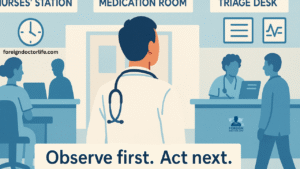
Build Strong Relationships with the Staff
Adapting isn’t just about systems—it’s about people. Nurses, ward clerks, and allied health professionals are often the ones who know the hospital inside out.
-
Be approachable. A smile and a simple “Could you show me how this is usually done here?” goes a long way.
-
Respect their expertise. A nurse who has worked on the ward for 15 years can teach you tricks that no orientation booklet will cover.
-
Show gratitude. Small thank-yous build trust quickly.
For new doctors abroad, the World Health Organization (WHO) highlights how effective teamwork and respectful communication can improve patient outcomes (WHO: Patient Safety & Teamwork).
Master the Electronic Medical Record (EMR) Quickly
For many new hires, the steepest learning curve is the hospital’s electronic medical record system (EMR). What feels like endless clicking at first can become second nature with practice.
-
Dedicate time to learn. Spend a focused hour just exploring menus, templates, and shortcuts.
-
Shadow a colleague. Watch how experienced staff use the system efficiently.
-
Use help resources. Many EMRs have built-in tutorials or cheat sheets.
The sooner you master the EMR, the faster you’ll complete your work and avoid unnecessary stress.
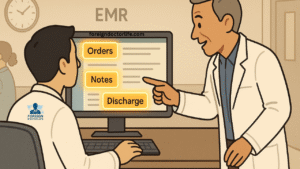
Prioritize Communication & Cultural Adaptation
Every hospital has its own culture. In some places, calling a consultant directly is encouraged; in others, it’s considered inappropriate unless filtered through a registrar. If you’re working abroad, cultural nuances become even more important.
-
Listen more than you speak at first. It helps you catch subtle rules of interaction.
-
Adapt your communication. Be mindful of hierarchy and tone.
-
Learn key local phrases. Even a few words in the local language can build rapport quickly if you’re a doctor abroad.
Create a Personal Survival Checklist
The first weeks in a hospital can feel chaotic. Having your own checklist makes daily work smoother and prevents last-minute stress.
-
Where are emergency drugs and equipment kept?
-
Who are the key contact people for each shift (charge nurse, registrar, pharmacist)?
-
Where can you find commonly used forms and supplies?
-
What are the top five emergency protocols you should know by heart?
Keeping this written down—whether in a pocket notebook or your phone—gives you a safety net until everything becomes second nature.
For more on navigating those first few weeks, you can read My First 100 Days as a Doctor Abroad, where I share the challenges and lessons from adapting to a foreign hospital system.
Focus on Self-Care While Adjusting
A new job can be exhausting. Between long shifts, information overload, and constant learning, burnout is a real risk.
-
Protect your sleep. Even short naps help during irregular shifts.
-
Eat consistently. Pack healthy snacks to avoid running on coffee and sugar.
-
Move your body. Short walks or quick exercises reduce stress and clear your mind.
Remember: you cannot adapt well if you are running on empty. Taking care of yourself is part of professional success.
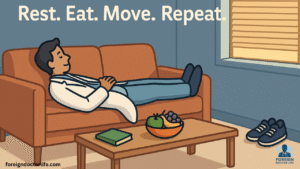
Final Thoughts
Adapting to a new hospital system takes time, but you can accelerate the process by focusing on three key things: understanding workflow, building relationships, and mastering tools like the EMR. Add to that a strong dose of communication awareness and self-care, and you’ll find yourself settling in faster than you thought possible.
The truth is, every doctor and nurse faces these challenges. What sets apart those who thrive is their willingness to observe, ask, and adapt quickly.
If you’re starting your first role soon, remember this: it’s normal to feel overwhelmed. But with the right mindset and strategies, you’ll not only survive—you’ll thrive.
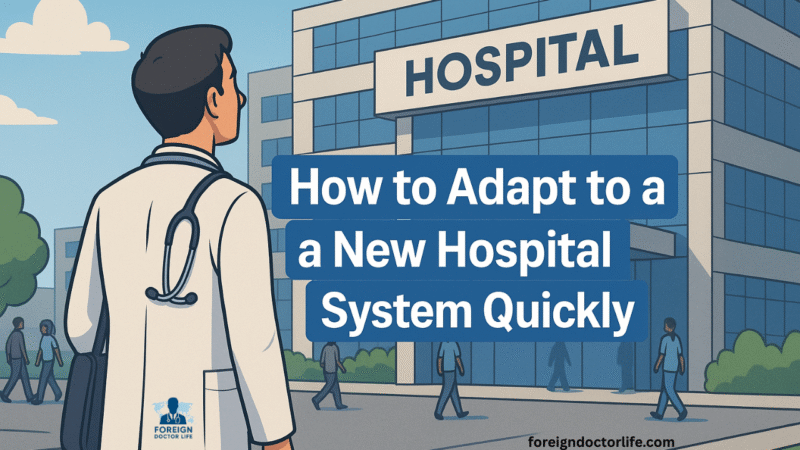




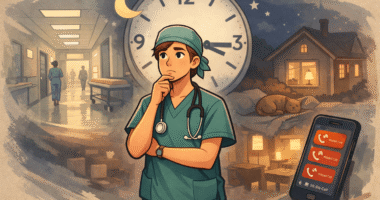




6 comments
Thanks for sharing
Thanks for your patience…..
Thanks for sharing 💕
Best wishes 💖
Really appreciate your efforts 👌
Really appreciate your efforts Dr.